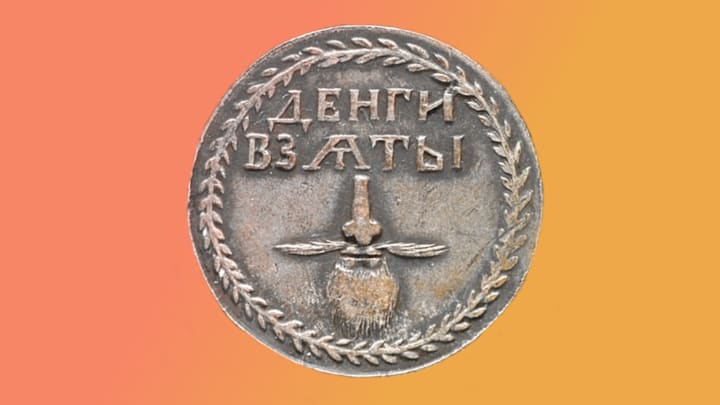Winston Churchill once wrote, “We contend that for a nation to try to tax itself into prosperity is like a man standing in a bucket and trying to lift himself up by the handle.” Wise words, as would be expected from such a man. But history is full of kings and governments who have tried just that, no matter how leaky the bucket.
1. Cooking Oil
The Pharaohs of ancient Egypt didn’t mess around when it came to taxing their subjects. Tax evasion or inaccurate declarations were punishable by flogging or death, and an army of scribes was tasked with ensuring taxes were paid on everything from grain to beer to transport along the Nile. And if any brave, budget-conscious soul thought that reusing cooking oil was a good idea, they had better watch out for the scribes. The recycling of cooking oil was against the law, and the scribes would search homes for used oil. If found, they’d offer a stern warning and force the homeowner to buy fresh oil, and to pay the appropriate tax.
2. Urine

Urine collectors were a common sight in the public toilets of Ancient Rome. The ammonia-rich urine was used in a number of processes, including tanning, wool production, the cleaning and whitening of woolen togas, and the whitening of teeth. So when the Emperor Vespasian needed to top his coffers, he decided to slap a tax on urine, to be paid by all purchasers of public pee. The Latin phrase Pecunia non olet (“money does not stink”), which is still used today, is attributed to Vespasian. He died in 79 CE during a bout of explosive diarrhea, while incongruously muttering, “Dear me, I think I'm becoming a god.”
3. Cowards
If a knight in medieval England had better things to do than go fight in another war, he could pay what was known as scutage. Sometimes called the “cowards tax,” this payment allowed the knight to skip military service on a particular campaign. King John, who reigned from 1199 to 1216, famously abused this tax, often demanding it even when the country was not at war.
4. Bachelors
When Augustus, the first Emperor of Rome, brought his particular brand of piety into play, some single men found themselves out of favor. While Augustus rewarded families with three or more children (sons, preferably), unmarried men of 38 years or older were hit with a bachelor tax, as well as being banned from attending public games. With the Lex Julia de maritandis ordinibus, the emperor also forbade childless marriages and celibacy. Similar taxes have been imposed throughout history. In 1695, the English parliament taxed bachelors over 25 years old and childless widowers. From 1941 to 1990, the Soviet Union taxed bachelors, single people, and small families in an attempt to combat declining demographics.
5. Enemies
When Oliver Cromwell ruled the British Isles as Lord Protector (1653 to 1658), he had a problem with pesky Royalists. To keep them in check, he needed to raise militias. To pay for the militias, he came up with a novel solution: He would tax his enemies. He slapped a 10 percent income tax, known as the “decimation tax,” on the Royalists, arguing that it was entirely justified. After all, the militia wouldn’t need financing in the first place were it not for the conspiratorial Royalists.
6. Beards

It’s often claimed that King Henry VIII of England introduced a tax on beards, despite there being no records to prove it. Russia’s Peter the Great, however, did place a tax on his bearded subjects. In 1698, in a bid to bring Russia up to speed with Western Europe’s trend for cleaner shaves, he imposed an annual beard tax. His poorer subjects were allowed to wear a beard for just two kopeks a year, while wealthy citizens had to pay 100 rubles. Bearded tax-dodgers could be forcibly shaved by the police, while those who paid the tax were given a copper token to carry, which proved that their beard was fully paid for.
7. Windows
The window tax was first implemented in Britain in 1696, as a way to tax citizens based on their assumed wealth. More windows meant a larger home, and the owner would therefore have to pay more taxes than a poorer person in a smaller home with fewer windows. In theory, it made some sense, but it didn’t work as well as planned. The definition of a window complicated matters, and some people were taxed for a variety of wall-based openings that hardly qualified as windows. Other homeowners simply bricked up their windows to avoid paying the tax. This lead to health issues, with poor light and ventilation placing residents at greater risk of typhus, smallpox, and cholera. The tax was eventually repealed in 1851.
8. Pretty Much Everything in the Georgian Era
Just as people had finished bricking up their windows at the start of the 18th century, along came the Georgian era and a spate of taxes like no other. The Georgians seemingly slapped taxes on anything they could to pay off Britain's war debts [PDF]: bricks, candles, clocks and watches, gin, glass, hats, wallpaper, medicine, playing cards, and soap.
This story originally ran in 2021; it has been updated for 2022.
